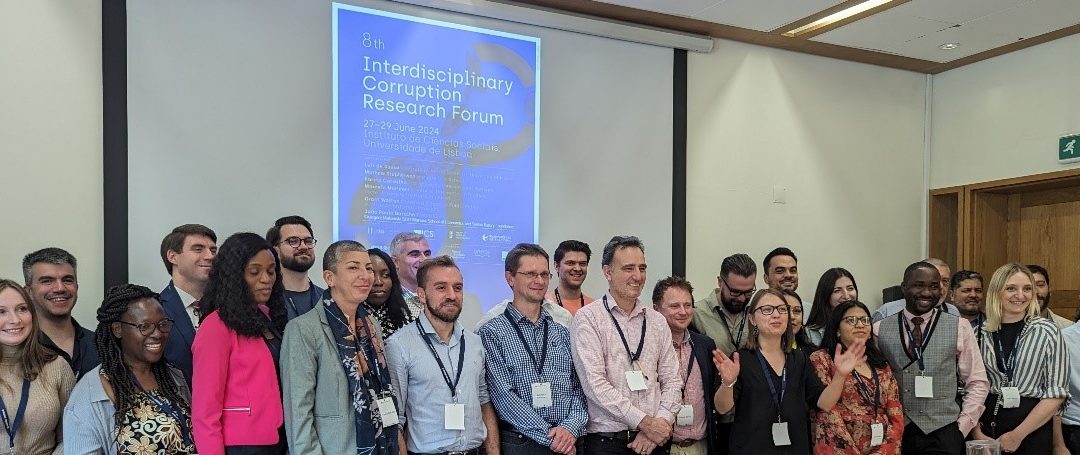By Muhammad Dalhatu.
From June 27th to 29th, 2024, the 8th Interdisciplinary Corruption Research Forum (ICRN) brought together leading scholars and practitioners at the Institute of Social Sciences, University of Lisbon: ICS-ULisboa, to explore the complex issue of corruption and identify solutions to combat it. The Forum was in partnership with: IFIS PAN, TI Portugal, IPSA / AISP R20 and Frente Civica and sponsored by ECPR, YSI and GRACE UNODC.
The forum offered a diverse range of activities, including presentations of research findings, discussions of ongoing projects, and collaborative brainstorming sessions. NAMIP participated in a co-creation panel session titled. ‘Bridging the Gap: How Media Organizations Can Report on Corruption While Building Revenue Sustainability for Thriving Societies.’
In the face of rampant corruption, media organizations play a crucial role in holding power accountable and exposing wrongdoing. However, the financial viability of investigative journalism often poses a challenge, threatening the sustainability of critical reporting on corruption. This panel session explored innovative approaches to corruption reporting and revenue generation.
The session featured leading media organizations from Nigeria – Dataphyte and Premium Times – showcasing their experiences and impact. The first panellist, Oluseyi Olufemi, Insight Lead at Dataphyte, shared their approach of employing data-driven journalism to analyse and visualize corruption patterns. This method exposes systemic issues and holds perpetrators accountable. For further details about this discussion, you can check out Dataphyte’s Data Dives Newsletter.
The second panellist, Oluwaseyi Ayeni, Senior Editor at Premium Times, delivered a compelling presentation titled, ‘Conducting In-depth Investigations on National Corruption Scandals: Influencing Policy Reforms and Sparking Public Debate.’ She shared insights from Premium Times’ notable coverage of a certificate forgery scandal, which can be found here.
Both panellists also discussed their revenue generation models while conducting investigative journalism, including digital subscriptions through leveraging subscription models to provide exclusive access to in-depth investigative reporting, and creating engaging content that attracts advertisers and sponsors while maintaining journalistic integrity. Other researchers delved into diverse topics including:
- Corruption Perceptions and Populism: Exploring the correlation between populism and public perceptions of corruption.
- Anti-Corruption Strategies: Evaluating the effectiveness of existing anti-corruption initiatives and proposing new approaches.
- Impact of Corruption: Analysing the detrimental effects of corruption on sectors such as healthcare and public procurement.
The forum went beyond highlighting the problems; it focused on solutions. Studies explored the role of grassroots anti-corruption movements, the intersection of technology and anti-corruption efforts, and the crucial link between a healthy democracy and reduced corruption levels. Specific areas of focus included:
- Transparency Indicators: Identifying and implementing effective measures for greater transparency in governance.
- Empowering Women in Politics: Examining the positive impact of women’s political representation on anti-corruption efforts.
- Climate Governance: Addressing corruption risks and fostering transparency in climate change initiatives.
- Oversight Against Election Corruption: Analysing the role of legislative oversight in preventing and detecting corruption in elections.
The ICRN Forum 2024 served as a crucial bridge between research and policy. Researchers exchanged ideas, initiated collaborative projects, and provided valuable insights that can inform future anti-corruption strategies.
The Forum ended with a Corruption Walk in Lisbon, where participants followed paths of corruption by government officials and corporate firms. The walk began at Marquês de Pombal Square, continued on Brancaamp Street, made a stop at one of the offices of the Bank of Portugal, and ended at Barata Salgueiro Street, the former headquarters of BES (Espírito Santo Bank). This experience provided a deeper understanding of the factors that drive corruption. It was emphasized that developing effective, multi-faceted strategies is crucial in minimizing corruption and promoting transparency and integrity. The discussions at the forum highlighted the importance of ongoing interdisciplinary collaboration in addressing this global issue.

